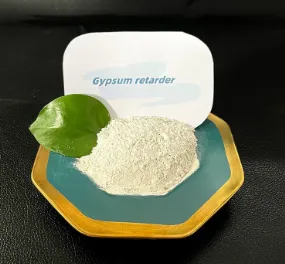
-

Add: HeBei ShengShi HongBang Cellulose Technology CO.,LTD.
-

Email
13180486930@163.com -

CONTACT US
+86 13180486930

Gypsum Retarder Guide
A plastering retarder is crucial in controlling the setting time of gypsum plaster. It slows down the hardening process, allowing workers more time to apply and smooth the plaster without rushing. This extra working time prevents premature drying and cracking, ensuring a smooth, durable finish on walls and ceilings.

Retarder in Gypsum – Types and Functions
The retarder in gypsum products typically includes organic acids like citric acid and tartaric acid, as well as phosphate compounds such as sodium hexametaphosphate. These retarders delay the gypsum’s chemical setting reaction, making the plaster easier to mix and apply. Their function is vital for achieving consistent quality and improved adhesion in construction projects.
Retarders in Gypsum Products – Why They Matter
Retarders in gypsum products improve the flexibility and workability of materials such as gypsum boards, putties, and bonded gypsum. By extending the setting time, they allow better handling and reduce waste. Builders rely on these additives to avoid hurried work, enabling precise finishes and stronger structural integrity.
Gypsum Retarder – Commonly Used Compounds
The most effective gypsum retarders include citric acid, sodium citrate, and potassium tartrate. Among these, citric acid stands out for its strong retarding ability even at low doses. Phosphate retarders like sodium polyphosphate also play a significant role, especially in industrial gypsum product manufacturing, providing controlled hardening and improved durability.
Most Common Retarder in Gypsum – Citric Acid
The most common retarder in gypsum is citric acid due to its excellent efficiency and environmental friendliness. It is biodegradable and safe to handle, making it popular among manufacturers. Citric acid provides a longer working time, which helps reduce material waste and increases overall project quality.
Gypsum Retarder FAQs
What is a plastering retarder used for?
It controls the setting time of gypsum plaster, allowing longer workability and preventing cracks.
Which compound is the most effective retarder in gypsum?
Citric acid is considered the most effective and widely used gypsum retarder.
Can gypsum retarders improve product durability?
Yes, they ensure proper curing and reduce premature drying, which enhances strength.
Are gypsum retarders environmentally safe?
Many retarders like citric acid are biodegradable and safe for the environment.
Where can I buy quality gypsum retarders?
Visit our company website for premium gypsum retarders tailored to construction needs. Contact us for samples and orders to improve your building projects today!
Gypsum retarders are indispensable in modern construction, offering practical benefits that improve work quality and efficiency. By choosing the right retarder, such as citric acid or phosphate compounds, builders ensure durable, crack-free finishes and sustainable operations. For reliable products and expert guidance, explore our website and make your next construction project smoother and stronger.
-
The Function of Polymer Powder in Thin-Bed MortarsNewsAug.25,2025
-
Polypropylene Fiber for Waterproofing MembranesNewsAug.25,2025
-
Starch Ether as a Thickener in Construction GroutsNewsAug.25,2025
-
Rubber Powder as a Sustainable Additive in GroutsNewsAug.25,2025
-
Gypsum Retarder Chemical Dosage and Its Precise EffectsNewsAug.25,2025
-
Using HPMC to Reduce Cracking in Cementitious ProductsNewsAug.25,2025
-
Wood-Based FibresNewsAug.20,2025











